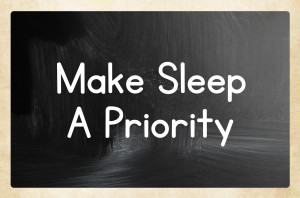What Your Sleep Patterns Are Really Telling You
We, as a culture, are sleep-deprived. Among the many dangers of being starved for sleep is that we mask our sleeping woes and fool ourselves into thinking we aren’t tired. We need an intervention!
The National Sleep Foundation (NSF) released a poll in 2011 showing a number of alarming statistics.
- 43% of Americans (ages 13-64) report rarely sleeping well on a weeknight.
- 60% of Americans report experiencing a sleep disorder most nights (if not every night).
- Roughly two thirds of American’s report not having their sleep needs met.
- 95% of those surveyed report using interactive technology* in the hour prior to sleep.
[* This study distinguishes between passive technology (television, music, etc.) and interactive technology (cell phones, video games and internet surfing). As one would imagine, interactive technology poses a greater threat to your mind and body winding down before bed.]
So what is happening to us? The evidence that supports the strong connection between nighttime screen time and sleep dysfunction is ongoing. By now, we’ve likely all heard about the effect artificial light exposure has on our sleep. Let’s review, just for fun: The more artificial light we take in closer to bedtime, the more our body suppresses the release of the sleep-promoting hormone melatonin. According to Dr. Charles Czeisler, this “…enhances our alertness and shifts circadian rhythms to a later hour—making it more difficult to fall asleep.” But is the issue really just about screen time at night? Or can we honestly consider some deeper, lifestyle changes we may need to make?
Common Root Causes
If we think about the act of falling asleep, it comes down to control. The phrase “fall asleep” indicates that we must let go of anything we are holding onto and fall into our sleep. Yet, as our culture asks that we gain more and more control over our existence, the act of falling asleep begins to run counter to our changing instincts. Feeling as though we have no control over sleep may breed anxiety and tension, which only takes us further away from our much-needed rest. The sheer pace of our lives can also feed the issue of sleep-deprivation. Rather than strike a healthy work-life balance, we strive to be on top professionally. This eventually leads to hyperactivity and spinning wheels. The unfortunate result of our busyness is that we train our brain and body to move faster and faster. At night, when we finally slow down, we are left with a dizzying merry-go-round of blurred thoughts and feelings. Lastly, we mustn’t discount what troubled sleep might be telling us about our emotional state. Insomnia is increasingly linked to a number of that go untreated if we aren’t dealing with them. There are a number of other possible root causes that we can only discover if we take the time to explore ourselves.
- Slow down. Create time in your day for slowing down, processing and connecting to yourself on a deeper level. This can be done through breath work, meditation and mindfulness. Though some of our days are more demanding than others, treat this as a priority and make it happen.
- Practice letting go. If healthy sleep is about control, we need to become good at surrendering. This can be done through a mantra that adjusts your frame of mind throughout the day (“I am not in control and I am okay”). When we encounter a situation that causes us tension, we can use those moments as opportunities to practice letting go of control.
- Make lifestyle changes. The strategy for improving our sleep is less about quick fixes and more about lifestyle changes. Though technology can be helpful (sleep-tracking apps, Fitbit, etc.), it can also feed the problem. The best solution may be to make small, simple changes to your routine that allow your body to find health naturally. Eating a balanced diet, staying hydrated and getting sufficient exercise are obvious factors in getting good sleep. Finally, you can engage in some simple rituals before bed to help you prepare for sleep.
- Reach out. If, in your self-exploration, you discover that the root causes are a little daunting – be sure to reach for help. Help should be sought for issues such as anxiety, depression, addiction, trauma and persistent relational conflict. A good guiding principle: If you feel you want help, just ask.
Good luck in the journey!
Lesley Anne Mendonça
M.A., LMFT-Associate, LPC-Intern
Supervised by Dr. Amy Fuller, LMFT-S, LPC-S











